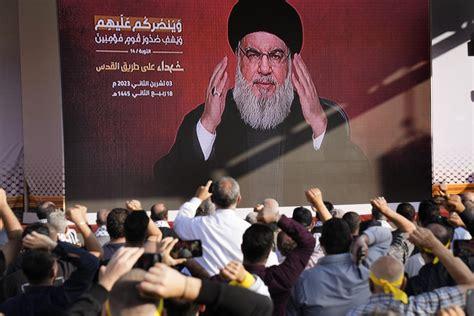
Hezbollah leader threatens escalation in fighting with Israel
The leader of Lebanon’s Hezbollah has said his powerful militia is engaged in cross-border fighting with Israel and has threatened further “realistic escalation”.
In a speech widely anticipated in the region, Hassan Nasrallah stopped short of announcing that Hezbollah had fully joined the Israel-Hamas war but warned that fighting on the Lebanon-Israel border would not be limited to the scale seen so far.
The US, Israel’s strongest backer, has warned Hezbollah and its patron Iran against entering the fray and has sent warships to the Mediterranean, a move that Nasrallah claimed “will not scare us”.
A spokesperson from the US national security council said: “We and our partners have been clear: Hezbollah and other actors – state or non-state – should not try to take advantage of the ongoing conflict.”
Speaking to a huge crowd in Beirut’s Ashura Square, Nasrallah, the general secretary of the Lebanese Shia militant organisation, praised the Hamas attack four weeks ago in southern Israel in which more 1,400 people were killed. He said the attack “was purely the result of Palestinian planning and implementation”, suggesting his militia had no part in it.
Saying that Hezbollah had “joined the battle” on 8 October, Nasrallah thanked groups in Yemen and Iraq, part of what is known as the “Axis of Resistance” that includes Shia Muslim Iraqi militias who have been firing at US forces in Syria and Iraq, and Yemen’s Houthis, who have fired drones at Israel.
Nasrallah said operations had been increasing “day by day”, even as Israel’s prime minister, Benjamin Netanyahu, warned Hezbollah against testing Israel or else “they would pay dearly.”
Nasrallah made clear that Hezbollah’s intention was to tie down Israeli troops that could otherwise be deployed in Gaza, warning that further escalation in the north was a “realistic possibility”.
Nasrallah’s speech had been anticipated throughout the region as a sign of whether the Israel-Hamas conflict could spiral into a regional war, after daily exchanges across Israel’s northern border between Israel and Hezbollah and other factions in southern Lebanon.
Since the beginning of the war, Hezbollah, an ally of Hamas, has taken calculated steps to keep Israel’s military busy on its border with Lebanon, but not to the extent of igniting an all-out war.
The Israeli military said seven of its soldiers and one civilian had been killed on the northern border as of Friday. More than 50 Hezbollah fighters and 10 militants with allied groups, as well as 10 civilians including a Reuters journalist, have been killed on the Lebanese side of the border.
Israel considers the Iran-backed Lebanese Shia militant group its most serious immediate threat, estimating that Hezbollah has about 150,000 rockets and missiles aimed at Israel, as well as drones and surface-to-air and surface-to-sea missiles.
A full-on conflict would be costly for Hezbollah, which fought a 34-day war with Israel in 2006 that ended in a draw – but not before Israeli bombing reduced swaths of southern Lebanon, the eastern Bekaa Valley and Beirut’s southern suburbs to rubble.
A new all-out war would displace hundreds of thousands of Hezbollah’s supporters and cause wide damage at a time when Lebanon is in the throes of a historic four-year economic meltdown.
In the hours leading up to Nasrallah’s speech there was increasing tension in northern Israel’s border communities, which have already seen widespread evacuation in recent weeks.
In Kfar Giladi, a kibbutz located 2km from the Lebanese border, a sign on the entrance to the bomb shelter said “No entry to Radwan”, referring to Hezbollah’s special commando force. The men standing sentry at the gate in military fatigues were the kibbutz’s home guard.
“I don’t care what he has to say. He’s a terrorist. What he won’t say is ‘peace on earth’,” said Nimrod Sharabi, a mechanical engineer who was born on the kibbutz, before Nasrallah’s speech.
Sharabi’s wife and family had gone to the Netherlands, uncertain when the border would be quiet enough again for people to return. “The fighting could go on for months. I don’t know. But we don’t have a good government. It’s very weak,” he said.
Tom Cohen, 28, had flown back from Australia, where he lives, to defend the kibbutz where he grew up. “We saw the missile that hit Kiryat Shmona on Thursday evening fly over. We could see the flames from the engine. What’s strange is seeing the whole kibbutz evacuated. Even in the 2006 war, people stayed. But now, after what happened in the south [on 7 October], everyone feels that they are a target.”
His family had evacuated to Tiberias. “The things that happened in the south caused a lot of fear,” he said. Half of the kibbutz was out of bounds, most exposed to fire from Lebanon. “Everyone has been waiting for the speech, but it’s a joke. We know what he [Nasrallah] stands for. Hezbollah is a terrorist organisation. The mistake that we made was to allow Hezbollah a window to build up it strength.”
Kiryat Shmona, a city that was almost deserted earlier this week, had now emptied even further after the second direct rocket strike on a building in a week. An armoured personnel carrier and Humvees patrolled, while in the woods soldiers moved among the trees.
Source » theguardian.com





